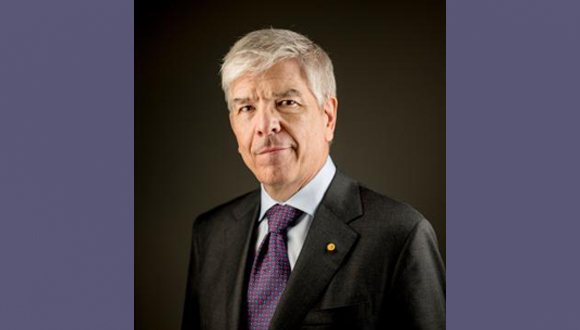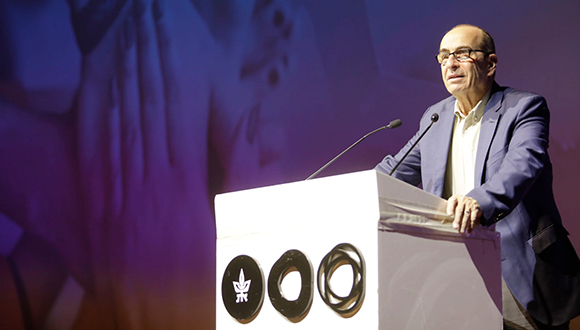
Tel Aviv University Launches the International Graduate School for Social Sciences
School manifests Israel’s leadership in many arenas related to the social sciences.
The Gershon H. Gordon Faculty of Social Sciences at Tel Aviv University, under the leadership of its Dean, Prof. Itai Sened, is launching a new initiative that targets the global arena: The International Graduate School of Social Sciences. The School will offer a range of MA programs in the English language for students from all over the world, and host leading international experts, researchers, and lecturers. Full activities will commence in October 2022, at the beginning of the 2022-23 academic year.
Program Jump-Started by Nobel Laureate
The School’s first guest, who arrived this week, is Prof. Paul Romer from NYU, 2018 Nobel Prize Laureate in Economics, and one of the world’s most inspiring thinkers in his field. Prof. Romer is a staunch supporter of the new initiative and has agreed to lead the School’s excellent cohort of visiting scholars. During his current visit he conducted workshops for outstanding students and young faculty, delivered a lecture to the Friends of TAU, and give an interview to well-known Israeli journalist Guy Rolnik.
Dr. Ro’ee Levy from The Eitan Berglas School of Economics, who researches political economy and social media, on his meeting with Romer: “I am excited to meet a Nobel Laureate in Economics and hear his thoughts on burning economic issues. Prof. Romer won the Nobel Prize together with William Nordhaus for his research on economic growth, and explored how innovation contributes to long-term growth. While economists have already realized that entrepreneurship and knowledge contribute to economic growth, Romer explored the conditions that encourage more entrepreneurship. Instead of assuming that technological developments occur on their own at random, he modeled these developments as dependent on economic conditions. The obvious conclusion is that economic policy can encourage entrepreneurship and technological advancement and thus influence economic growth.”

Prof. Paul Romer is a staunch supporter of TAU’s new initiative
Israel – Much More than The Hi-Tech Nation
The International Graduate School of Social Sciences serves as an umbrella for the Faculty’s five existing international MA programs – Developing Countries (sustainable development), Migration Studies, Conflict Resolution and Mediation, Security and Diplomacy, and Cyber Politics and Government – which are annually attended by about 150 students, both international and Israeli. Five more programs will be added in coming years, including Climate, Trauma, and Public Health, bringing the number of students to approximately 300 annually. Upon graduation, most alumni will join international organizations and Non-Profit Organizations active in their fields of study.
Sened believes that the new School, in its very essence, manifests Israel’s leadership in many arenas related to the social sciences. “Everyone talks about the hi-tech nation,” he says, “but we have a great deal more to offer. Israel has accumulated immense knowledge and experience in many non-technological areas, and Israeli expertise is in great demand all over the world. Our School’s programs will address many of these disciplines, making the vast knowledge amassed here at Tel Aviv University, and throughout the state of Israel, accessible to the entire world.”
This claim is corroborated by most of the School’s current and future programs: Public Health (in collaboration with TAU’s Medical School) – a field in which Israel’s critical edge was revealed during the recent pandemic; Sustainable Development (with an emphasis on developing nations) and Climate Change – where Israel’s geographical location on the edge of the desert has generated considerable expertise; Trauma (collaboration with the Schools of Psychology and Social Work), Conflict Resolution and Security and Diplomacy – in which our country’s constant state of conflict has inevitably bred extensive experience; Migration Studies – whose complex issues are extensively explored in our multicultural nation of immigrants; Cyber Politics and Government (digital governance), relying on Israel’s technological prominence; and more.
International Hub for the Exchange of Ideas
The School’s wealth of MA programs will be complemented by a unique track to the PhD: 10 outstanding undergraduates, completing their BA at the Faculty of Social Sciences, will be admitted to an accelerated PhD program, which includes a scholarship for the entire period of studies, a co-supervisor from a leading university abroad, and a year of studies at the supervisor’s institution.
Academic faculty will benefit from the dynamic two-way flow of scholars generated by the School, with Israeli lecturers and researchers visiting top institutions all over the world, and their colleagues from other countries (20-30 every year, 2-3 at any given time), coming to TAU to conduct research and teach in the various international programs.
At present, the Faculty of Social Sciences is discussing a range of student exchange agreements with several world-leading academic institutions, including: the Johns Hopkins University branch in Bologna, Northwestern University in Illinois, Science-Po in Paris, and EUI (European University Institute) in Venice.
“The new International Graduate School of Social Science reflects the vision of the President of TAU,” notes Sened. “Namely, enhancing TAU’s visibility and leadership in the international arena. On the one hand, we attract students from all over the world, who wish to benefit from the knowledge accumulated here in Israel, and specifically at TAU, in the social sciences. On the other, we essentially ‘bring the world’ to Israeli students and faculty – in the form of world-class lecturers, researchers, and supervisors from around the globe. In this way, we reduce the regrettable ‘brain drain’ and encourage our excellent students and researchers to stay here with us. Ultimately, thanks to its dynamic entrepreneurial spirit, the School will become an international hub for the exchange of ideas and growth of knowledge in many areas of the social sciences that are at the heart of the human experience and critical challenges of our times.”

“Everyone talks about the hi-tech nation, but we have a great deal more to offer.” – Prof. Itai Sened, Dean of the Faculty of Social Sciences
